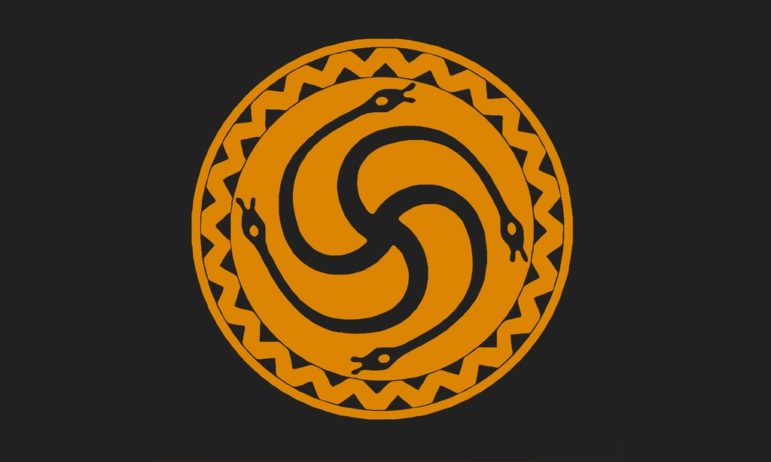VILNIUS, Lithuania – The Lithuanian parliament, the Seimas, has once again rejected state recognition of Romuva, the Indigenous traditional Baltic Pagan religion of the nation.
The evening before the vote in the Seimas, Krivė (High Priestess) Inija Trinkūnienė, addressed the Lithuanian government and the nation in a public letter, urging “Lithuanian citizens, religious denominations and politicians to sincerely respect the human rights to freedom of thought, conscience and religion.”
After deliberating on Thursday, September 29, 2022, the Seimas returned the decision to the Romuva community. Thirty-four members of the Seimas voted for approval, 19 were against, and 18 abstained. In the Seimas, abstentions are counted as “against” because they suggest no support.

Romuva Flag – Image credit: DiegoAma – WikiCommons
The vote from the Seimas comes after the Romuva community was originally rejected on Thursday, June 27, 2019, after which on June 8, 2021, the European Court of Human Rights (ECHR) ruled that Lithuania had violated the human rights of Romuva by not recognizing the religion.
Recognition of Romuva by the Lithuanian state would confer upon the group various legal rights including being able to receive tax credits for real property, function as a charity, provide social insurance coverage for its clergy, and gain legal recognition of marriages performed by its clergy. They would also gain the right to airtime from national broadcasters to present religious services.
Currently, besides the nine state-recognized and Seimas-sanctioned traditional religious communities that receive exclusive rights and state funding, there are 4 non-traditional religious communities recognized by the Seimas: Baptists, Adventists, Pentecostals, and the New Apostolic Church. All other religious communities, regardless of whether they are officially registered, are considered as “non-state recognized.”
“Romuva respects traditional and other religious communities registered in Lithuania, emphasizing their desire for peaceful coexistence. We invite you not to create religious discord between people who profess different religions, not to return to the Middle Ages and to value the ancient Baltic faith as a part of the ancestors, Lithuania’s historical, spiritual, and social heritage,” says Trinkūnienė in a press release.
Previous votes on recognizing Romuva were opposed by the Lithuanian Catholic church and other Christian denominations. In its opinion, the ECHR wrote, “the Seimas refused to grant status asserting that the members of the Seimas had not relied on the conclusions of the relevant authorities, but had based their decision on their own religious convictions and political interests: they had invoked the applicant association’s alleged threat to Christianity, quoted the arguments presented by the Lithuanian Bishops’ Conference in its letter to the members of the Seimas, and made baseless allegations about the applicant association having links to the Kremlin.”

Lithuanian Seimas [Photo Credit: Augustas Didzgalvis CCA-SA 4.0]
Despite the ECHR’s admonishment, the Seimas again heard the same arguments opposing Romuva. Conservative MP Vilija Aleknaitė-Abramikienė quoted the Russian political philosopher Alexandr Dugin and linked the Baltic community to the Kremlin. Dugin’s commentary has been frequently characterized as fascist ideology and some have referred to him as “Putin’s mouthpiece.” She claims the Kremlin supports anyone who does not support Christianity and extends that belief to the Romuva community. Dugin has commented that one of the Kremlin’s greatest enemies is the Catholic church and that anyone who opposes the church should be supported.
“I remember one book – the 1995 book by Alexander Dugin, the now often mentioned Putin ideologue, published the book “The Geopolitical Future of Russia.” As a young politician, I read it and did not forget that page where it is written that one of the biggest enemies of the Kremlin in Lithuania is the Catholic Church,” Aleknaitė-Abramikienė said adding these are attempts to weaken Christianity in Lithuania.
Romuva has nothing to do with Christianity, Catholicism, or anti-Catholic bias.
Uģis Nastevičs, Ph.D., a scholar on Latvian and Baltic Studies with specific expertise in comparative religion told The Wild Hunt that the allegations are baseless. He said, “This is deliberate disinformation to deny the Romuva of their rights.” He noted that legal scholars have commented that the ECHR decision supersedes and exposes the politics.
Indeed, one conservative member of the Seimas, Kęstutis Masiulis, said, “I have no sympathy for either Paksas or Romuva, but the decisions of the ECHR must be respected.”
Nastevičs noted that even the fundamental history presented by conservatives of the Seimas is disordered. “Under Soviet rule, there was only state atheism. Any religious community was the target of KGB investigation and subjected to persecution.” He noted that believers were identified and then sent for “correction” or “offered” choices like becoming an informant against their religious group.
Some members of the Seimas went further questioning the religious identity of Romuva questioning their practices as real elements of faith. Seimas member Paulius Saudargas said, “The Romuva community is more of an ethno-cultural phenomenon, not a religious community.”
“These are their gods, these are their rites, this is their faith. Members of the Seimas cannot discuss this. In fact, we are the true holders of tradition, the true traditional ones,” said Trinkūnienė.
Nastevičs characterized the comments as outlandish and falsehoods, “They have no business questioning or discussing the nature of beliefs.”
“We feel insulted and humiliated. There is a war going on, and in the face of the war, the arguments of Putin’s ideologue are being relied on,” added Trinkūnienė; they are “very strongly influenced by the Catholic Church.”
Nastevičs said that his contacts in the Romuva community saw this as yet other steps in formal recognition that is exposing the structural religious hypocrisy by some members of the Seimas.
Indeed, despite the result of the vote, the resolution was returned for more development and to be presented to the Seimas again.
The Wild Hunt is not responsible for links to external content.
To join a conversation on this post:
Visit our The Wild Hunt subreddit! Point your favorite browser to https://www.reddit.com/r/The_Wild_Hunt_News/, then click “JOIN”. Make sure to click the bell, too, to be notified of new articles posted to our subreddit.